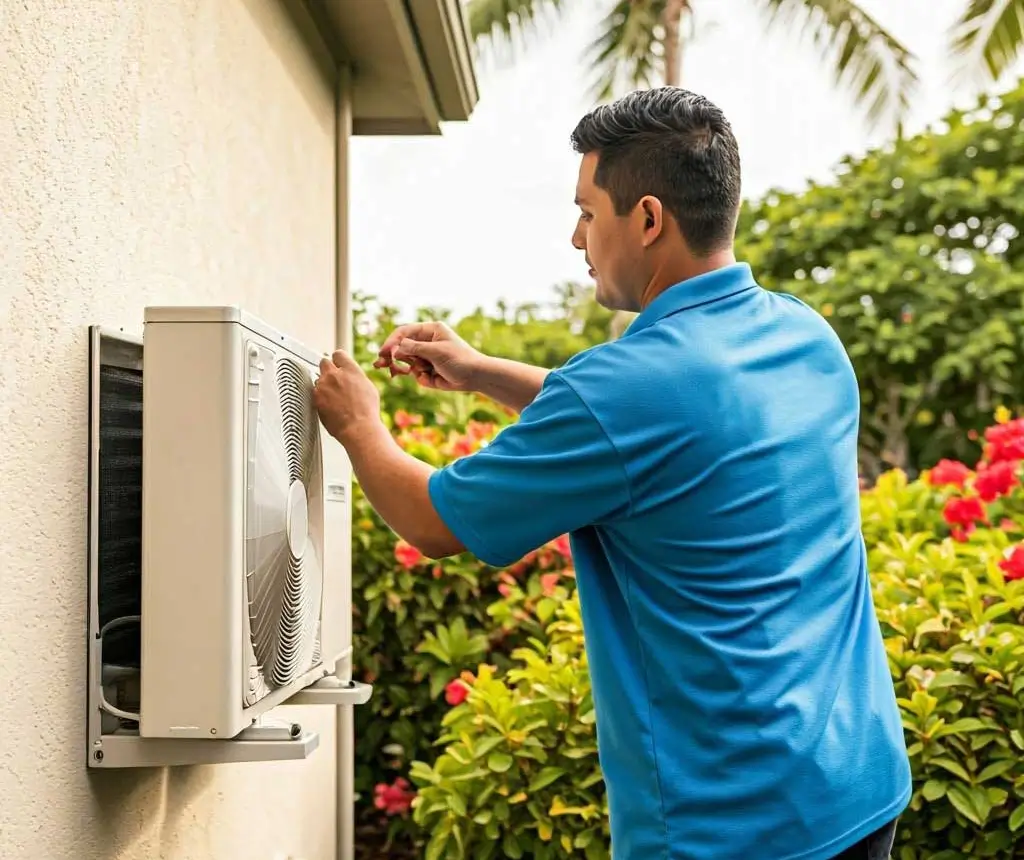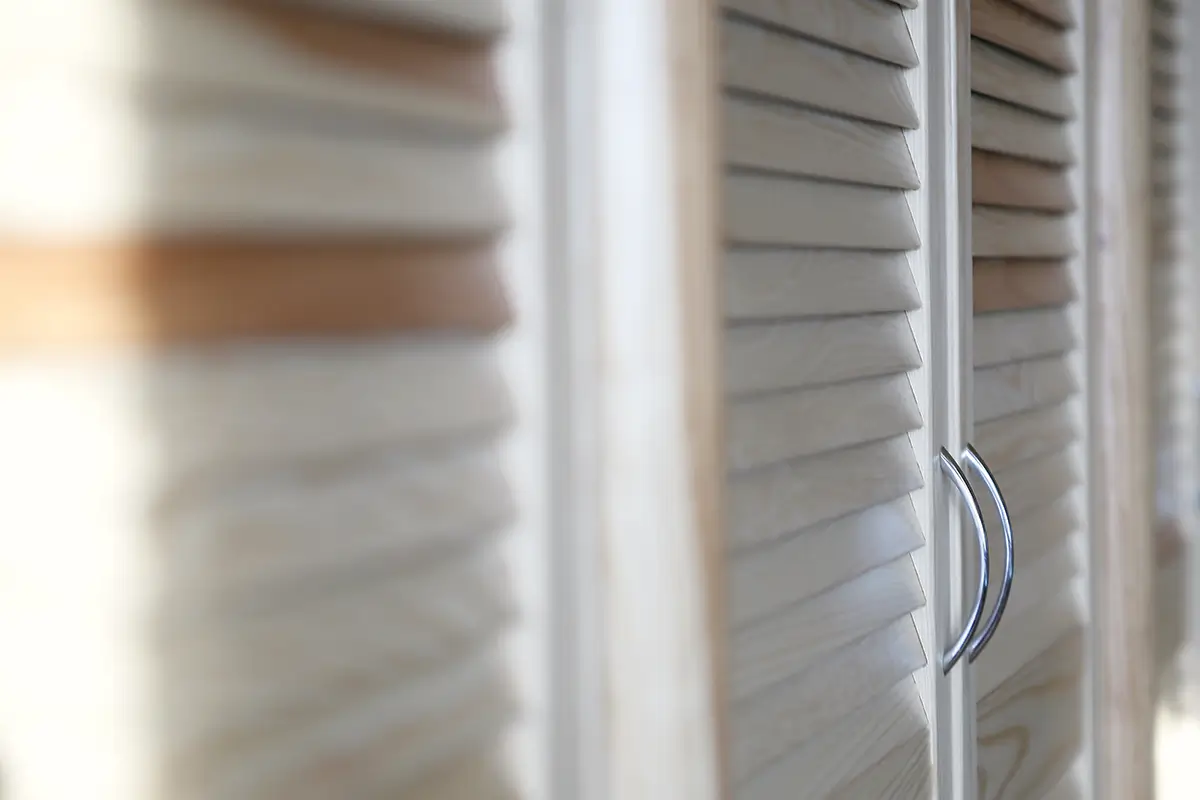Is your AC unit in Hawaii making strange noises? Loud sounds from an air conditioner often indicate a problem that needs attention. Here, we will help you identify common AC noises, understand their causes, and guide you on when to tackle them yourself and when to call in the professionals. Let’s get to the bottom of those disruptive AC sounds.
Normal AC Noises
Knowing what sounds are typical for an AC unit can help homeowners distinguish between normal operation and potential issues. Here are some common noises that are part of your AC’s regular functioning:
Soft Humming
A gentle humming noise when your AC is running is a standard sound. It usually originates from the motor and the flow of refrigerant, indicative of electrical components powering the unit and the refrigerant circulating through the system.
Mild Clicking at Startup/Shutdown
When turning on or off, it’s normal to hear a soft clicking noise. This sound is often the thermostat relay or other electrical components activating or deactivating, a routine part of the operation.
Whooshing Airflow
A whooshing or flowing sound when air moves through the ductwork and vents is typical. This noise signifies that your AC system is distributing cooled air throughout your home, a key function of air conditioning.
Occasional Dripping
Hearing dripping water, especially when the unit cycles off, is not unusual. This sound represents condensation generated by the cooling process being drained away, a necessary aspect of AC functionality, particularly in humid climates like Hawaii’s.
Brief Rattling on Startup
A slight rattling noise at the start of the AC unit is not uncommon. This can occur as the fan starts spinning or as other moving parts get into action. It should be brief and not continue past the startup phase.
Understanding these normal sounds of your AC unit is important in discerning when there might be an actual issue. These sounds should be consistent and not overly loud or disruptive. Being familiar with the normal soundscape of your AC can bring peace of mind and help you better identify when something is truly amiss.
Troublesome AC Noises
While some noises from your AC unit are normal, others can signal trouble. Here are several sounds that should prompt a closer look, as they often indicate issues requiring attention:
Squealing & Screeching
These high-pitched sounds typically originate from the blower motor or fan belt within your AC unit. They often indicate a belt that may be slipping or a motor bearing that’s in need of lubrication or replacement. In Hawaii’s humid climate, the combination of moisture in the air and constant usage can accelerate the wear and tear on these components. Squealing and screeching noises can also point to issues with the compressor or other internal mechanisms, especially if they persist during the entire operation of the unit.
Rattling
A rattling noise in your AC unit often suggests that there are loose components, such as screws, bolts, or other hardware, which can occur due to the regular vibration of the unit during operation. Additionally, in Hawaii’s lush environment, outdoor units are particularly prone to collecting debris like leaves, twigs, or even small pebbles, which can get inside the system and cause a rattling sound. If the noise intensifies or is accompanied by a decrease in AC performance, it might indicate more significant issues, like a loosening of the fan or motor assembly.
Thumping
A thumping sound usually signals something is off-balance within the unit. This is often caused by a misaligned or damaged fan blade hitting other components as it rotates. It’s a noise that shouldn’t be ignored, as continued operation in this state can lead to further imbalance, increase wear on the bearings, and potentially cause extensive damage to the fan and motor. In some cases, a thumping noise may also be due to the movement of flexible ductwork, particularly if it’s not properly secured.
Thwapping
The ‘thwapping’ sound, reminiscent of something repeatedly hitting against the fan blades as they spin, can be a telltale sign of an obstruction. This could be due to debris such as leaves, twigs, or even small animals like lizards or birds, which have found their way into the blower blades or housing. In the rich, diverse environment of Hawaii, outdoor units are particularly susceptible to such intrusions. Prolonged thwapping is not just noisy but can also unbalance the fan and put extra strain on the motor, leading to more serious issues.
Repeated Clicking
Continuous clicking noises that go beyond the typical startup sound are often indicative of electrical issues. These could range from a defective control, such as a relay or contactor, to a failing thermostat. Repeated clicking noises can also indicate issues with electrical connections or circuit boards. In Hawaii’s humid climate, corrosion or moisture intrusion in electrical components can be a contributing factor. Persistent clicking shouldn’t be overlooked, as electrical issues can impact the overall functionality of the AC and may even pose safety risks.
Buzzing
Buzzing sounds typically have an electrical origin and are usually heard from the outdoor unit. They can be due to a variety of issues, including loose wiring, a failing motor, or malfunctioning electrical components like the capacitor or contactor. The buzzing might also be caused by the vibration of loose parts or panels, which can be exacerbated by the constant operation of AC units in Hawaii’s warm weather. Electrical issues can be complex and, if left unaddressed, might lead to a system breakdown or safety hazards.
Banging
A banging noise from your AC unit often signals a severe internal problem. It could be something significant and loose, such as a connecting rod, piston pin, crankshaft, or even a blower wheel out of alignment. In some cases, it might indicate components within the compressor have become dislodged or damaged. These types of sounds are especially concerning because they suggest major mechanical issues that, if not addressed promptly, could lead to extensive damage or complete system failure. The complexity of these components, combined with Hawaii’s year-round reliance on AC, underscores the urgency of addressing banging noises as soon as they arise.
Grinding
Grinding noises typically indicate worn bearings in the AC unit’s motor. Over time and with constant use, these bearings can deteriorate, resulting in a harsh grinding sound during operation. This wear can be accelerated in Hawaii’s humid conditions, as moisture and salt air can contribute to the corrosion of metal parts. If these noises are ignored, the motor may eventually fail, leading to a complete breakdown of the AC unit. Swiftly addressing grinding noises can help prevent more expensive repairs and prolong the unit’s longevity.
Dripping
While a mild dripping sound is normal for condensation in air conditioners, constant or excessive dripping warrants investigation. It often points to issues with the drain pan or condensate line, such as clogs, cracks, or disconnections. In Hawaii’s humid environment, the AC units work hard to remove moisture from the air, and any hindrance in this process can lead to water buildup and potential leakage. Excessive dripping can also lead to water damage in your home if the condensate isn’t properly channeled away. Addressing this early prevents more extensive damage to both the AC system and your home.
Whistling
Whistling sounds in your AC system often point to issues within the ductwork. These can be due to leaks, blockages, or constrictions in the ducts that disrupt normal airflow. In Hawaii’s diverse range of home styles, ductwork can vary greatly and may be prone to such issues, especially if not regularly inspected. Whistling noises might also indicate that air filters are clogged or that there’s an improper fit somewhere in the system. Such airflow problems not only impact the efficiency of your AC unit but can also strain the system, leading to more serious issues over time.
Hissing
A hissing sound from an AC unit is often a red flag, usually pointing to a refrigerant leak or high pressure within the compressor. Refrigerant leaks are not just a performance issue; they can also pose environmental and health risks, especially in enclosed spaces common in Hawaiian homes. Additionally, high pressure in the compressor can indicate serious system malfunctions. These situations demand the skills of a professional due to the technical complexity and safety factors at play. Acting promptly on hissing sounds not only preserves your system’s performance and durability but also guards against potential risks.
Each of these noises warrants attention and serves as an indicator that your AC unit requires expert intervention. In Hawaii, where your AC is vital for daily comfort, being aware of these troublesome noises and their implications is key to maintaining a functional and efficient cooling system.
Troubleshooting Troublesome AC Noises
After identifying various concerning sounds from your AC unit, the next step is to troubleshoot these noises. Here’s how you can address each sound, to help determine whether you can resolve the issue or if professional help is needed.
Troubleshooting Squealing & Screeching Noises
Temporarily turn off the unit and inspect for any visible belt wear or looseness in the blower motor. A small amount of belt dressing, available at hardware stores, can be a temporary fix for a slipping belt. However, persistent noises often require professional repair or replacement of parts.
Troubleshooting Rattling Noises
Check for any loose screws, bolts, or panels on both the interior and exterior units. Tighten any loose components you find. If the rattling continues, there may be deeper issues, like a loose fan blade, that need professional attention.
Troubleshooting Thumping Noises
Inspect the fan blades for misalignment or damage by turning off the unit and visually checking the blades. If a blade is bent or damaged, avoid running the unit and call a technician for repair.
Troubleshooting Thwapping Noises
When the unit is off, check for and remove any debris caught in the blower blades or housing. Always make certain that the unit is completely powered down before attempting to clear away debris.
Troubleshooting Repeated Clicking Noises
This often requires a professional inspection as it could be related to electrical components. However, you can check the thermostat for loose connections or replace its batteries as a first step.
Troubleshooting Buzzing Noises
Inspect the outdoor unit for loose parts or panels that could be vibrating. Buzzing from electrical components, however, is typically a job for professionals due to safety risks.
Troubleshooting Banging Noises
Banging noises usually indicate something major has broken or come loose inside the unit. It’s advisable to turn off the unit immediately and consult a professional.
Troubleshooting Grinding Noises
This often signifies serious motor issues. Turn off the unit to prevent any additional damage, and get in touch with a technician for a comprehensive inspection.
Troubleshooting Excessive Dripping
Check the condensate line for clogs or the drain pan for cracks. Clear any blockages, but if the issue persists, professional help may be needed to prevent water damage.
Troubleshooting Whistling Noises
Inspect for gaps or leaks in the ductwork and ensure air filters are clean. Ductwork issues, however, often require professional sealing or repair.
Troubleshooting Hissing Noises
Due to safety and technical complexities, hissing sounds, especially those indicating refrigerant issues, should be addressed by a professional technician.
While some troubleshooting steps can be performed safely by homeowners, certain noises, particularly those relating to electrical components, refrigerants, or internal mechanical failures, require the expertise of a professional.
When to Call the Professionals
While basic troubleshooting can resolve certain AC noise problems, there are situations where the knowledge and skills of a professional are indispensable. Recognizing these instances ensures your AC gets the right care and attention it needs, particularly important in Hawaii’s climate where AC systems are heavily relied upon.
Complex Electrical Issues
If your troubleshooting efforts point to electrical problems, especially if there are persistent clicking or buzzing sounds that suggest deeper issues, it’s time to call in a professional. Electrical repairs require specialized knowledge and pose safety risks, making them unsuitable for DIY.
Refrigerant Concerns
Any indication of refrigerant problems, such as hissing sounds or signs of a leak, warrants professional intervention. Handling refrigerant requires certification due to its hazardous nature and environmental impact.
Major Mechanical Failures
Sounds like banging or grinding, suggesting significant internal damage, are clear signs to cease DIY efforts. These noises often mean there are serious issues within the unit that require professional repair or part replacement.
Persistent and Unresolved Noises
If the noises persist despite your troubleshooting attempts or if they recur regularly, it’s time to seek professional help. Ongoing issues can indicate a complex problem that needs a trained eye.
System Performance Issues
If you notice a decline in your AC’s performance, like insufficient cooling or irregular cycling, coupled with troubling noises, professional diagnostics are needed to pinpoint and resolve the underlying issues.
Safety Concerns
Whenever you’re unsure or uncomfortable with addressing certain AC issues, especially those that involve electrical components or require opening up the unit, it’s safest to contact a professional.
In situations like these, experienced technicians from services like Steve’s Plumbing & AC Service can provide the necessary expertise. They offer comprehensive diagnostics and repairs, ensuring your AC unit functions efficiently and quietly, maintaining the comfort of your Hawaiian home.
Keeping Your Cool with Steve’s Plumbing & AC Service
As we wrap up our exploration of AC noises and their meanings, remember that understanding these sounds is just part of maintaining a comfortable and functional home in Hawaii. For all the complexities and nuances of AC maintenance, repair, and installation, you can rely on the expertise of Steve’s Plumbing & AC Service.
Why Choose Steve’s Plumbing & AC Service?
- Expertise in AC Repair: Our experienced technicians excel in identifying and resolving various AC noises and problems, guaranteeing the smooth operation of your unit.
- Comprehensive Maintenance Services: Consistent maintenance plays a vital role in averting potential issues down the line. Our team offers thorough maintenance services to keep your AC in top condition.
- Professional Installation: Need a new AC unit? We offer expert installation services to ensure your new system is seamlessly tailored to your specific Hawaiian residence.
At Steve’s Plumbing & AC Service, we’re committed to providing you with high-quality, reliable service for all your air conditioning needs. Whether it’s a strange noise, routine check-up, or a brand-new installation, our team is here to ensure your comfort in Hawaii’s warm climate.
Ready for Expert AC Services? Contact us today at (808) 563-4054. Let Steve’s Plumbing & AC Service be your go-to for all your AC needs, keeping your home cool and comfortable all year round.










